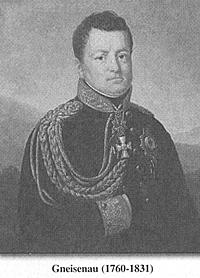Wellington and Blucher
Meet 16 June 1815:
Before the Battle of Ligny
Gneisenau’s "Evidence” According to Pflugk-Harttung
by Gary Cousins, Germany
| |
Gneisenau (1760-1831) Obviously he referred to Delbrück’s life of Gneisenau, the major and substantial biographical work drawing upon Gneisenau’s pa-pers, which included discussion of the meeting at Brye; but he also did research of his own. 17
Pflugk-Harttung suggested that because Wellington had been Britain’s representative for the latter part of the Congress of Vienna of 1814-15, and was seen as having been instrumental in denying Prussian interests in the negotiations, he was already deeply mistrusted by many Prussians, including Gneisenau and others on the Prussian Staff. Gneisenau had had high hopes for Prussia of the outcome of the 1815 campaign. It seemed possible that Napoleon - the enemy of all Europe - might be overthrown in one great battle on the 16th June, assumed by the Prussians and to be decided by Prussian might alone (see footnote 3).
The political consequences would fall out naturally and (hopefully) favourably for the Prussians: the political and territorial benefits which it felt it had been denied at the Congress. With the
Prussians defeated at Ligny on the 16th June, and forced to withdraw to Wavre, while Wellington had held out and might even be considered to have won at Quatre Bras, Prussia’s political prospects and military pride were hurt; because no support arrived at Ligny from Wellington on the 16th June, Wellington was criticised; and one of the chief accusers was Gneisenau.
Pflugk-Harttung examined several letters and reports, mostly dating from the 17th June, written by Gneisenau or in which he had a hand, and sent to friends and various Prussian dignitaries - specifically to the King of Prussia, Knesebeck, Hardenberg, Gibsone, Dobschütz and Kleist. 18
These explained the Prussians’ misfortunes as being caused by Wellington’s insufficient concentration or broken promises of support.
Pflugk-Harttung examined these issues in detail. He concluded that while some criticism of the issue of concentration was perhaps merited, the Prussian were also to blame in no small measure, for poor communication on the 15th June; and that they themselves had not concentrated successively. 19
As for promises, Pflugk-Harttung examined the messages exchanged and discussions held between the two allies, up to and including the 16th June 1815, the day of the battles of Ligny and Quatre Bras - from the May meetings at Tirlemont and in Brussels, to the so-called “Frasnes Letter” from Wellington to Blücher on the morning of the 16th June. He concluded that, examined precisely and objectively,
and in possession of the full facts about actual events, all of the communications up to and including those of the 16th June speak of Wellington’s general intention to co-operate with his Prussian allies – but everything speaks against a precise and unconditional promise to provide direct support for the Prussians in the specific circumstances in which they found - some might say put - themselves at Ligny on
the 16th June.
It was unfortunate for the Prussians, if this was their mistaken interpretation or expectation, but it was not Wellington’s fault that they had this impression, nor that in the event he was unable to meet their expectations. At the last such opportunity for discussion, the meeting at Brye, Pflugk-Harttung believed that Wellington conducted himself correctly, and certainly made no unconditional promises of
support at Ligny.
Pflugk-Harttung found that all of the documents which he examined, which Gneisenau wrote or was involved in writing, contained false and inaccurate assertions and claims, which Pflugk-Harttung rejected on the basis of his conclusions about the Prussian criticisms. Gneisenau was lashing out in all directions for excuses for the Prussians’ defeat at Ligny, to exonerate himself and the Prussian Staff from blame for making the fundamentally flawed assumptions which had led to that battle being given, and to shift the blame onto Wellington. Under such circumstances, Gneisenau would have had no grounds to keep secret any promises supposedly made at the Brye meeting and subsequently broken.
Yet considered precisely, in these statements Gneisenau did not once mention the meeting at Brye, in which both he and Wellington had participated, nor any specific promises supposedly made at the Brye meeting – even though some of the statements were made the day after the meeting and the battle of Ligny. Pflugk-Harttung therefore concluded that Gneisenau’s statements offered no evidence for, indeed rather spoke against, the claim that such an unconditional promise was made at Brye. What was said at Brye may have reassured and reinforced the decision to fight at Ligny, but it did not cause that decision to be made in the first place, and certainly did not cause the loss at Ligny: for that decision and the defeat, Wellington was blameless. Pflugk-Hart-tung conceded that most of these statements
were written in the middle of events, just after Ligny and just before Waterloo: there was hardly time to review the earlier communications between the two HQs precisely and objectively, so they no doubt relied upon memory and subjective impressions of the moment.
But in Pflugk-Harttung’s opinion, it was rather more the case that they revealed much about Gneisenau’s feelings – of deeply hurt pride about the loss of the battle of Ligny, and of bitterness towards Wellington.
Wellington and Blucher Meet 16 June 1815 Before the Battle of Ligny
|
 Another man who was present at the meeting at Brye, but left no account thereof, was Gneisenau, chief-of-staff to the Prussian army. Pflugk-Harttung looked particularly at Gneisenau’s role in the issue and indeed in the campaign.
Another man who was present at the meeting at Brye, but left no account thereof, was Gneisenau, chief-of-staff to the Prussian army. Pflugk-Harttung looked particularly at Gneisenau’s role in the issue and indeed in the campaign.